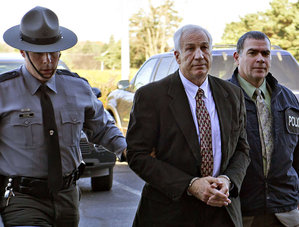By Sandra Shea
Philadelphia Daily News
November 11, 2011
http://www.philly.com/philly/news/pennsylvania/133674693.html
 |
THE Philadelphia-based Joseph J. Peters Institute provides outpatient assessment and treatment services in the area of sexual abuse. We talked with Thomas F. Haworth, the institute's director of child and adolescent services, about some of the big questions surrounding the Penn State scandal.
Q. Given the cases in the
Catholic church and, now, Penn State, it seems these kinds of cases are increasing. How common is this form of abuse?
A. To clarify, this type of abuse, that is outside the family [extrafamilial], is less common than intrafamilial, or incest. However, it is more common than with strangers. It involves a community authority figure who exploits their access to children for sexual gratification.
It is unlikely that this type of abuse is increasing, but the fact is that child sexual abuse continues to be an international epidemic. Children continue to be exploited and/or sexually accosted at the hands of individuals they believe they can trust. A study from 1990 [Finkelhor, Hoating, Lewis, & Smith ]asked adults about their experiences as children, and 27 percent of females and 16 percent of males reported histories of child sexual abuse.
Q. One thing that's surprising
is your mention that more girls than boys report abuse. But these big cases, like Penn State, primarily involve men abusing boys. What's that about?
A. I think your question points to what perhaps we see in our society as more lurid, and disconnected from the common man - that is, molestation of a male by a male. Certainly, many priests in the Catholic church did abuse females, but we hear less about it. It's not necessarily that these men have a preference for male children, though some may. Their interest is in prepubescents. Boys are easier to get access to, and so boys make better victims. They tell at a lower rate than girls. And, particularly in an athletic setting, the pressure is on to be hyper-masculine, and it makes it harder to come forward.
Q. But what about the
witnesses? I think a lot of people have a hard time understanding the idea that you could witness or be aware of something like a child being abused and not say anything.
A. I, too, struggle with this part of the story. A grown man walks by and observes a 10-11-year-old boy being anally penetrated by another adult man and he doesn't yell, throw something, run out and call the police?
One has to wonder about the internal culture in the program, as well as the grad assistant's personal history, that would lead him not to act in safety of the child in that moment.
Family members will deny abuse (physical, sexual, or emotional) or come to tolerate it for various reasons - maintaining lifestyle, not believing or blaming the child, choosing their partner over the child.
But, in the current situation these men are unrelated; it's a locker room, and the witness stated that he observed the subject anally penetrating a 10-11-year-old boy - it is a very sad story.
But at Penn State, we aren't talking about family members here, but people within the same organization.
There is some interesting literature linking all-male competitive groups, such as frats and sports teams, to increased incidents of dating violence and the endorsement of dysfunctional sexual attitudes or what some researchers [e.g. Sandra Bem, 1970s] have referred to as "rape-supportive beliefs." So, the current situation is just one more piece of information that screams out how badly we need to bring sexual-misconduct-prevention training into locker-rooms and other all-male groups.
Q. What can be done to help
discourage cases like this?
A. We have to continue a public dialog that reminds parents and other community members that child sexual abuse is not usually the result of a stranger lurking in the park. Rather, it is more likely to come from those who share our homes, break bread with us at our tables, and share stories with us at the water cooler. Exploitation of children and other vulnerable people occurs at the hands of people who have access to them and opportunity, and so we need to manage that access to children better.
Any original material on these pages is copyright © BishopAccountability.org 2004. Reproduce freely with attribution.